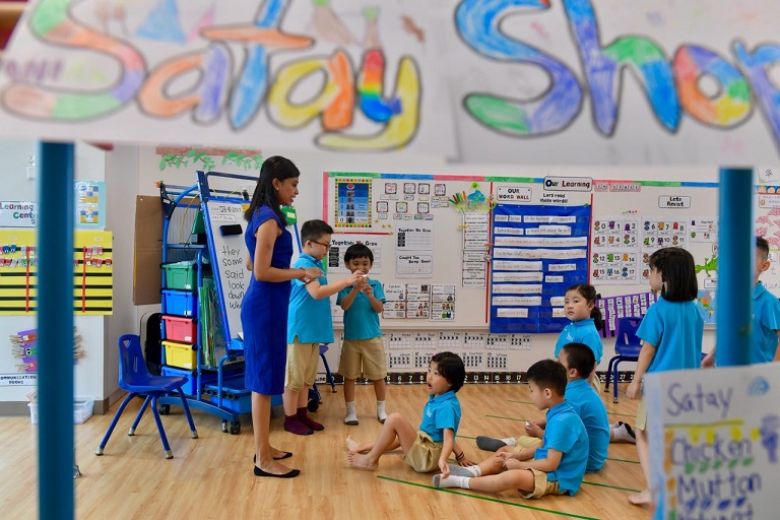To help children better transition to Primary 1, those attending Ministry of Education (MOE) kindergartens will be given priority to enter the primary school that shares a compound with their kindergarten.
MOE said this will involve 12 kindergartens as part of a pilot scheme next year. Kindergarten children applying for admission to the respective primary school will be eligible under Phase 2A2 of the Primary 1 registration scheme, which currently applies to children whose parent or siblings had studied in the primary school, but had not joined the alumni association.
The change, announced Monday (Nov 27), puts MOE kindergarten children ahead of those who apply in the next phase 2B, which gives priority to parent volunteers and those with church or clan links.
The Ministry though assured parents that it will continue to set aside a minimum of 40 places for Phase 2B and 2C. It also said that it will provide sufficient school places on a regional basis so that no child will have to travel long distances to his or her primary school.
Schools involved include Riverside Primary, Farrer Park, Punggol Green and West Spring.
When asked why MOE was making this move, Minister for Education (Schools) Ng Chee Meng said: “MOE always has the child at the centre of its policy making. It will facilitate the child’s learning in a more familiar environment… we hope to enable the child to have a smoother transition to Primary 1.”
MOE assured that the planned intake from its kindergartens will be below that of the associated primary school. Parents may also choose another primary school.
But it admitted that “as demand situations differ from year to year, we are unable to predict the demand situation in individual schools and kindergartens”.
“The MOE kindergartens are located in areas with upcoming developments and families with young children. We expect healthy demand for these school-based kindergartens as well as the primary schools in that area.”
MOE explained that it was making this change to help children have an easier transition to the associated primary schools. “Facilitating them to remain in a familiar physical, social and educational environment for their primary school education will help smoothen their transition to Primary 1.
“With a close partnership between the kindergarten and the primary school, the latter would also be more familiar with the needs of the children, and can more quickly ensure that they have the necessary developmental support when they enter Primary 1.”
Currently about half of MOE Kindergarten children register for the co-located primary schools. Each kindergarten takes in about 60 to 120 children every year.
When asked if it had considered according the same priority to children attending private kindergartens near primary schools, such as Nanyang Kindergarten which is next to Nanyang Primary School, MOE said its kindergartens come under the purview of primary schools they are associated with and the heads and teachers work closely with the primary school teachers.
“There is curricular and pedagogical continuity between the kindergartens and the primary school, given the professional exchanges between the kindergarten and primary school educators. Private kindergartens do not have similar arrangements,” said MOE.
Prime Minister Lee Hsien Loong had announced in his National Day Rally speech in August that MOE will scale up to 50 kindergartens in the next five years, in a bid to increase the quality of pre-school education.
Following that, MOE announced that it will open 13 new MOE kindergartens in 2019 and 2020 in areas with high demand. All of them will be located in the same compound as primary schools in areas including Punggol, Sengkang and Yishun. Of the 13, seven will open in 2019, and six in 2020.
Article & Photo from Straits Times


